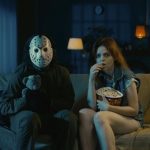 Weird Stuff
Weird Stuff  Weird Stuff
Weird Stuff  Travel
Travel 10 Beautiful Travel Destinations (That Will Kill You)
 Miscellaneous
Miscellaneous 10 Modern Marriage Rituals Born from Corporate Branding
 Weird Stuff
Weird Stuff Ten Bizarre Visions of 2026 from Fiction
 Weird Stuff
Weird Stuff The 10 Unluckiest Days from Around the World
 Food
Food 10 Modern Delicacies That Started as Poverty Rations
 Movies and TV
Movies and TV 10 Shared TV Universes You’ve Likely Forgotten About
 Weird Stuff
Weird Stuff 10 of History’s Greatest Pranks & Hoaxes
 Miscellaneous
Miscellaneous 10 LEGO Facts That Will Toy with Your Mind
 Misconceptions
Misconceptions 10 Widespread Historical Myths and the Texts That Started Them
 Weird Stuff
Weird Stuff 10 Wild Facts About Taxidermy That You Probably Didn’t Know
 Travel
Travel 10 Beautiful Travel Destinations (That Will Kill You)
 Miscellaneous
Miscellaneous 10 Modern Marriage Rituals Born from Corporate Branding
Who's Behind Listverse?

Jamie Frater
Head Editor
Jamie founded Listverse due to an insatiable desire to share fascinating, obscure, and bizarre facts. He has been a guest speaker on numerous national radio and television stations and is a five time published author.
More About Us Weird Stuff
Weird Stuff Ten Bizarre Visions of 2026 from Fiction
 Weird Stuff
Weird Stuff The 10 Unluckiest Days from Around the World
 Food
Food 10 Modern Delicacies That Started as Poverty Rations
 Movies and TV
Movies and TV 10 Shared TV Universes You’ve Likely Forgotten About
 Weird Stuff
Weird Stuff 10 of History’s Greatest Pranks & Hoaxes
 Miscellaneous
Miscellaneous 10 LEGO Facts That Will Toy with Your Mind
 Misconceptions
Misconceptions 10 Widespread Historical Myths and the Texts That Started Them
10 Interesting Stories Behind Famous TV Catchphrases
Catchphrases are common in many TV shows—from Joey asking “How you doin’?” in Friends to McGarrett’s “Book ’em, Danno” in Hawaii Five-O. Some catchphrases have even become so popular that they’ve outlasted the show they originally came from.
Being such cultural juggernauts, you might think these catchphrases were expertly crafted for maximum impact. But they’re actually sometimes the result of improvisation. Not every catchphrase has an interesting story behind its creation, but here are 10 that most certainly do.
Related: The Ten Most Iconic Television Shows of the Twenty-First Century
10 “Cowabunga!”
In the original Teenage Mutant Ninja Turtles comic books—which were first published in 1984—Michelangelo didn’t have a catchphrase. It wasn’t until 1987, when the first animated TV show aired, that Mikey’s signature “cowabunga!” made its debut. The nonsense word can be traced back to the 1950s and the TV show Howdy Doody, where it was used by Chief Thunderthud as an expression of surprise and anger. Then, during the ’60s, the word filtered into surf culture as a term of excitement.
TMNT writer David Wise gave the word to Michelangelo after reading it in a Peanuts comic years earlier. “Schulz did a surfing series, and one of his punchline panels featured Snoopy running toward the water with a surfboard, thinking `Cowabunga!’ I thought that was pretty cool, and the word stayed with me,” he told the Chicago Tribune.
Wise envisioned Michelangelo as a “Harpo Marx-surfer type floating above everything like Sean Penn in Fast Times at Ridgemont High.” Producer Fred Wolf wasn’t so sure about the word. Still, during the recording of the pilot episode, it was undeniable that “cowabunga” was the perfect thing for party dude Mikey to yell out.[1]
9 “Whatchu talkin’ ’bout, Willis?”
Although younger generations may not have seen a single episode of Diff’rent Strokes, they’ll almost definitely be familiar with Arnold Jackson (Gary Coleman) asking his older brother, “Whatchu talkin’ ’bout, Willis?” This iconic retort was penned by writer Ben Starr as “What are you talking about, Willis?” He credits Coleman with giving the simple line the flair that made it a phenomenon. He describes the child actor as “a born showman; he read lines like an old pro.”
After saying the catchphrase for years on the popular show, Coleman was strongly associated with it for the rest of his life—something he wasn’t a fan of. In a 2010 interview, his friend Ron Jeremy said that “he was a sweet guy, but he hated being asked to repeat ‘Whatchu talkin’ ’bout Willis?’… He didn’t want to live in the past.”[2]
8 “Pretty, pretty, pretty, pretty good”
Since the very first season of Curb Your Enthusiasm in 2000, Larry David—playing an exaggerated version of himself—has said his signature catchphrase: “Pretty, pretty, pretty, pretty good.” However, the saying might actually be many years older than the show itself.
During a 2009 interview on the Late Show with David Letterman, David explained that when he was 25, unemployed, and living at home, he felt rather depressed. “You can’t really tell your parents, particularly your mother, that you’re depressed,” he explained to Letterman. “They don’t take it very well, you know. You could be on the verge of suicide with your head in the oven, and they’ll come home, they’ll go, ‘How are you, Larry?’ ‘I’m good Ma, I’m good, I’m pretty good, pretty, pretty, good.’”
While he may have just used his by-then signature catchphrase to get a laugh out of Letterman and the studio audience, he may also have put it in the show precisely because he actually said it in his day-to-day life.[3]
7 “Did I do that?”
Nerdy and clumsy Steve Urkel (Jaleel White) was always accidentally messing up in episodes of Family Matters. His catchphrase response to these situations was, “Did I do that?” The writers always wanted Urkel to have a catchphrase, and a few different options were tested, including “Excuse me” and “I’ve fallen, and I can’t get up!” but none of them stuck. In the end, it was simply Urkel asking, “Did I do that?” that ended up catching on.
White says that it was instantly obvious whether the catchphrases would stick or not. “You had that live studio audience to tell you in real-time what was working,” he explained in a 2025 interview. White attributes the success of “Did I do that?” over the other attempted catchphrases not to the words themselves but to his funny line delivery.[4]
6 “It’s gonna be legen—wait for it—dary”
How I Met Your Mother was created by Carter Bays and Craig Thomas, but it wasn’t them who came up with Barney Stinson’s (Neil Patrick Harris) “legendary” catchphrase. That honor goes to Phil Lord and Chris Miller, now best known for their part in bringing the Spider-Verse to the screen.
Bays and Thomas gave Barney the catchphrase “wait for it,” and initially, they didn’t want to add any more. “We both felt very strongly: ‘Let’s not turn Barney into the Fonz, and let’s not make him a guy who does a bunch of catchphrases,’” Bays explained. But that was quickly done away with, and Barney became the catchphrase guy—liberally using, among others, “challenge accepted,” “suit up,” “wait for it,” and “legendary” (with the latter two often combined).
Lord is the one who first used “legendary” in a script and the first to put “wait for it” in the middle of the word. It was Miller who first drew the catchphrase out even further after thinking, “‘Dary’ is sitting out there all alone on an island.” He decided to extend the phrase to call even more attention to this: “Legen—wait for it, and I hope you’re not lactose intolerant—dary!”
Lord and Miller moved onto other projects after the first season, but Bays and Thomas ran with “it’s gonna be legen—wait for it—dary” and often made it even longer. “It’s this labyrinth of a sentence. That was our twist on it—make it tortured right away,” Thomas says.[5]
5 “Dyn-o-mite!”
It wasn’t originally the plan for J.J. (Jimmie Walker) to have a catchphrase on Good Times. While rehearsing a scene, Walker said, “Hey, that’s dynamite,” in response to something before carrying on with what was scripted. But director John Rich instantly seized on the word. He told Walker they’d include it in scenes and that he had to big up his delivery by showing off his teeth and widening his eyes.
Walker didn’t really understand why Rich thought it would be so entertaining. “John, come on. People will never be that stupid. Where will they buy it?” he recalls saying. Rich’s response: “Yes, they will.” Walker was happy to do it, but executive producer Norman Lear wasn’t a fan. According to Walker, Lear said, “I don’t know what it means, I don’t know what it’s about, I don’t know where it comes from. It’s the stupidest thing I’ve ever seen. I hate it.”
Rich wanted Walker to say the word multiple times in an episode, but Lear managed to haggle it down to just once. Lear wasn’t the only one with an issue; many of the other actors grew tired of hearing “Dyn-o-mite!” so often and, if they were able, would avoid the set when it was said.[6]
4 “Live long and prosper”
Star Trek’s season 2 premiere episode, “Amok Time,” sees Spock (Leonard Nimoy) return to his home planet. While shooting the episode, Nimoy asked director Joe Pevney if he should greet fellow Vulcans in a particular way because “as humans, we have these rituals, things that we do. We shake hands, we nod to each other, we bow to each other, we salute each other. What do Vulcans do?”
The decision was left up to Nimoy, so he drew on his Jewish roots to come up with the “V” hand gesture and accompanying “live long and prosper” saying. As a child, Nimoy was told not to look while the Hebrew benediction was being spoken, but he couldn’t resist peeking. He saw the Rabbi holding both hands in the “V” shape, resembling the Hebrew letter “shin.” Nimoy dropped one hand and kept the raised one closer to his body to create the Vulcan version of the gesture.
As for the words, they are paraphrased—and shortened—from the daily Hebrew prayers, called the Amidah. Translated into English, part of the prayer reads, “The Lord will bless you and protect you, the Lord will go kindly and graciously with you. The Lord will bestow his favor upon you and grant you peace.” Essentially, it’s a blessing to live a long and prosperous life.[7]
3 “D’oh!”
The Simpsons has spawned many catchphrases—from Bart’s “Don’t have a cow, man!” to Flanders’s “okily, dokily”—but one of the most popular is Homer’s classic “d’oh!” of annoyance. While recording a 1989 episode of the show—when it was still a short on The Tracey Ullman Show—Dan Castellaneta was asked to utter an “annoyed grunt.” He turned to Laurel and Hardy films for inspiration for the sound.
Scottish actor James Finlayson was the comic foil to Laurel and Hardy in many of their films, and he became known for saying a drawn-out “d’ooooooh!” as a substitute for the swear word “damn.” Groening loved Castellaneta riffing on Finlayson but asked him to make it a shorter sound to better fit the quick-paced animation.
Homer’s “d’oh!” became so iconic that in 2001, the Oxford English Dictionary even added the word to its catalog (although, for some reason, without the punctuation it’s usually written with).[8]
2 “Eat my shorts!”
Another iconic catchphrase from The Simpsons that was introduced by the voice actor is Bart’s “Eat my shorts” rebuke. Nancy Cartwright explains that she first ad-libbed the phrase during an early table read, and the writers thought it was funny enough to add to the script. She said it came from her time in her high school’s marching band when they would chant “Fairmont West! Fairmont West” while walking from the school to the football stadium. But during her senior year, they decided to change the chant to the rather ruder “Eat my shorts!”
Although most commonly associated with Bart Simpson, the catchphrase had previously been used, most notably in John Hughes’s The Breakfast Club (1985). Bad boy John Bender (Judd Nelson) tells Vice Principal Mr. Vernon (Paul Gleason) to “eat my shorts,” which earns him a few more Saturday detentions.[9]
1 “Yabba dabba doo!”
The Flintstones—which, along with The Simpsons, is one of the most popular cartoon shows of all time—gave the world the catchphrase “yabba dabba doo!” Usually uttered by husband and father Fred Flintstone, the phrase is also featured multiple times in the show’s theme song. The nonsense words weren’t just the result of speaking gibberish, though; they were actually inspired by an advert for the hair styling product Brylcreem.
Apparently, the original script for The Flintstones merely had Fred yell out “Yahoo!” but while recording the lines, Alan Reed—the first person to voice Fred—instead decided to be creative and ad-lib something. Reed had heard his mother repeatedly saying, “A little dab’ll do ya,” which was part of the jingle used in Brylcreem adverts. He took these lyrics and made them nonsensical to create Fred’s iconic “yabba dabba doo” catchphrase.[10]








